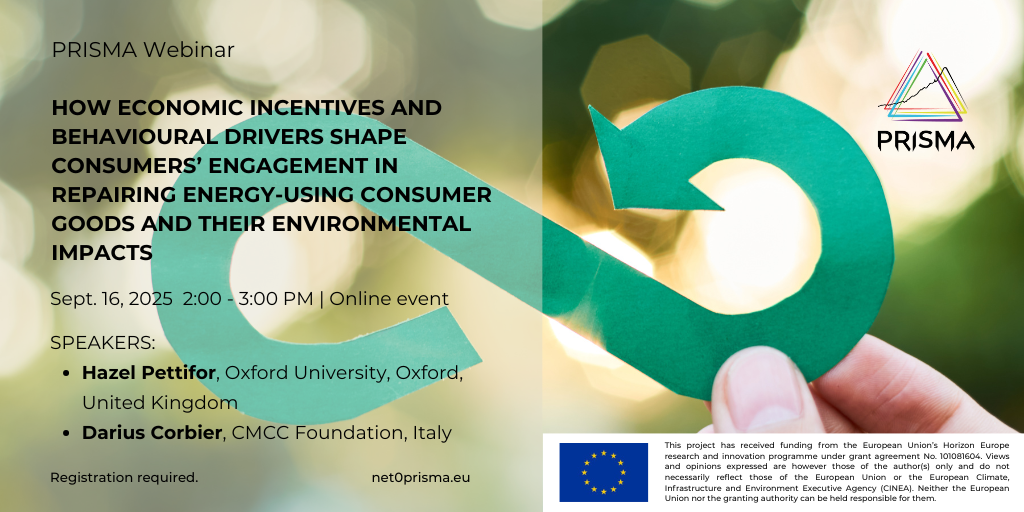Sept. 16th, 2025, 2:00 – 3:00 pm (Online event)

Title:
How Economic Incentives and Behavioural Drivers Shape Consumers’ Engagement in Repairing Energy-Using Consumer Goods and their Environmental Impacts
Speakers:
- Darius Corbier, CMCC Foundation – Euro-Mediterranean Center on Climate Change, Italy
- Hazel Pettifor, Oxford Center for the Environment, Environmental Change Institute, Oxford University, Oxford, United Kingdom
Abstract:
Under the Sound Material-Cycle Society, Japan’s Reduce-Reuse-Recycle framework reduced municipal waste. Since 2010 progress has slowed while primary resource use remains high. In this seminar we assess the environmental impacts of consumer-orientated ‘R’ strategies in Japan. We explore how economic incentives and lifestyle changes influence consumers’ adoption of repairing energy-using goods, comparing across different income groups. We apply a dynamic equilibrium model combining material flow analysis with a lifestyle model to two alternative policy scenarios (1) a repair bonus funded by EPR fees and (2) EPR fees as a standalone policy with redistribution. Each scenario is considered under low and high repair barriers and heterogenous repair behaviour drivers. When we equip high income groups with strong low-carbon cognitions we find that with low barriers, reduced repair costs could double repair rates at the expense of sharing, resulting in a 12 Mt/year decrease in waste by 2050. High barriers to repair reduce these gains by over two-thirds. Low-income groups, who need to save money, tend to respond more to price signals. The use of less-efficient repaired goods reduces the positive impact of lower CO 2 emissions associated with the manufacturing and incineration sectors, implying a trade-off between circular economy and climate mitigation goals. Increasing replacement costs through higher EPR fees encourages sharing and refuse more than repair behaviors, yielding smaller waste reductions but lower CO 2 emissions. Our findings highlight the importance of aligning price signals with measures that reduce barriers, address potential trade-offs and implement targeted awareness campaigns to achieve a sustainable circular economy.
The webinar will conclude with a 15-minute question and answer (Q&A) session.
Registration required: https://cmcc-it.zoom.us/webinar/register/WN_sErN3aMdSuuPBNQGQHr3Aw#/registration
This project has received funding from the European Union’s Horizon Europe research and innovation programme under grant agreement No. 101081604 – PRISMA. Views and opinions expressed are however those of the author(s) only and do not necessarily reflect those of the European Union or the European Climate, Infrastructure and Environment Executive Agency (CINEA). Neither the European Union nor the granting authority can be held responsible for them.
